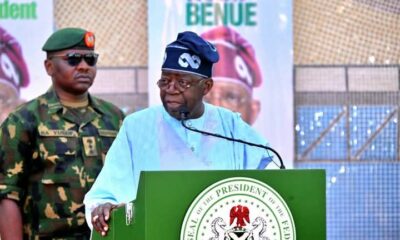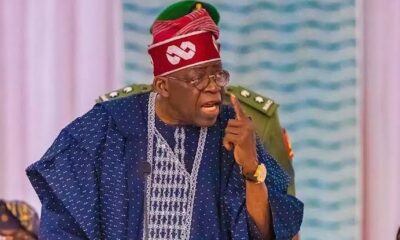National News
Presidency refutes Lamido, reaffirms Tinubu’s role in June 12 struggle

The Presidency has issued a strong rebuttal to claims made by former Jigawa State Governor, Sule Lamido, who accused President Bola Ahmed Tinubu of supporting the annulment of the June 12, 1993, presidential election.
In a statement released Sunday and signed by the Special Adviser to the President on Information and Strategy, Mr. Bayo Onanuga, the Presidency described Lamido’s comments as “a distortion of history and a regrettable attempt at revisionism.”
Reacting to Lamido’s televised remarks, Onanuga said: “Alhaji Lamido’s claims represent a distortion of history… These allegations are patently false.” He categorically denied Lamido’s assertions that Tinubu’s political relevance began with NADECO and that Tinubu’s mother, Alhaja Abibatu Mogaji, mobilised market women to support the annulment.
“Let us set the record straight: Alhaja Mogaji never mobilised market women to support the unjust annulment. Had she done so, she would have lost her position as market leader in Lagos,” the statement said.
The Presidency also turned attention to Lamido’s own role during the crisis. “It is important to remind Nigerians that Alhaji Lamido… was among those who failed to oppose the military’s injustice,”Onanuga stated, adding that Lamido and then SDP chairman, Chief Tony Anenih, “wrote their names in the book of infamy by surrendering the people’s mandate without resistance.”
In contrast, the Presidency recalled Tinubu’s early stand against the annulment. “On the Senate floor on August 19, 1993, Tinubu unequivocally condemned the annulment, describing it as another coup d’état and urging Nigerians to reject injustice and lawlessness,” Onanuga noted.
Quoting Tinubu’s Senate speech directly, the statement recalled him saying:
“We have a situation that suggests that the abortion of the June 12 election is another coup d’état… Yes, it is true that we have a crisis, but for every action, there must be a reaction… We have a government that made the law and abused its law. Therefore, the present military administration… has committed a crime.”
Onanuga further pointed out that Tinubu remained active even after the dissolution of democratic structures by General Sani Abacha, stating:
“Tinubu and a group of senators reconvened in Lagos, defying the junta… While in police detention, Tinubu continued to fund pro-June 12 protests in Lagos, including the blockade of the Third Mainland Bridge.”
The statement also noted Tinubu’s eventual exile and continued support for the pro-democracy movement from abroad:
“Tinubu lived in exile for nearly five years while Lamido and his ilk made deals with Abacha… Agents of the junta bombed his home in Balarabe Musa Crescent, Victoria Island.”
It added that Tinubu “backed Professor Wole Soyinka’s NALICON, offering material resources to fuel the struggle,” and was widely acknowledged by NADECO leaders and journalists for sustaining the resistance.
Describing Lamido’s criticism as disingenuous, Onanuga said:
“It is thus disappointing that Alhaji Lamido… would attempt to rewrite history for political reasons and being a member of the Coalition of the Disgruntled.”
He ended with a stinging rebuke:
“We do not want to believe that Alhaji Lamido suffers from what psychologists call tall poppy syndrome… However, the conclusion is inevitable as it appears that Lamido is envious of Tinubu’s democratic credentials.”
“The facts remain clear,” the statement concluded, “President Tinubu was and remains a steadfast advocate for democracy, in contrast to the record of Lamido and others who capitulated in the face of military oppression.”
-

 Business1 day ago
Business1 day agoDangote Refinery hikes petrol price
-

 National News2 days ago
National News2 days agoMan who breached security during Tinubu’s visit has psychiatric disorder — Police
-

 Politics1 day ago
Politics1 day agoNew political party emerges as anti-Tinubu coalition applies to INEC
-

 National News1 day ago
National News1 day agoBreaking: NNPCL spokesperson resigns
-

 Metro News2 days ago
Metro News2 days ago“Any girl that asks for transport, leave her” — Apostle Johnson Suleman
-
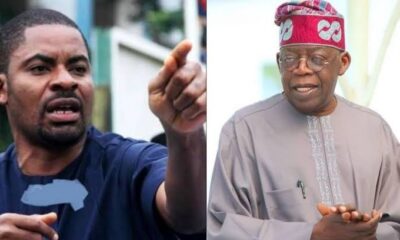
 National News1 day ago
National News1 day ago“Learn from critics, don’t attack them,” Deji Adeyanju applauds Tinubu, urges decriminalisation of defamation
-
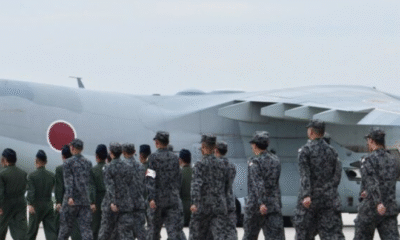
 National News1 day ago
National News1 day agoIran arrests 22 suspected Israeli spies amidst escalating conflict
-
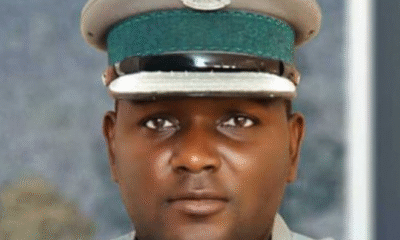
 Crime and Law1 day ago
Crime and Law1 day agoCustoms warn against fake recruitment



